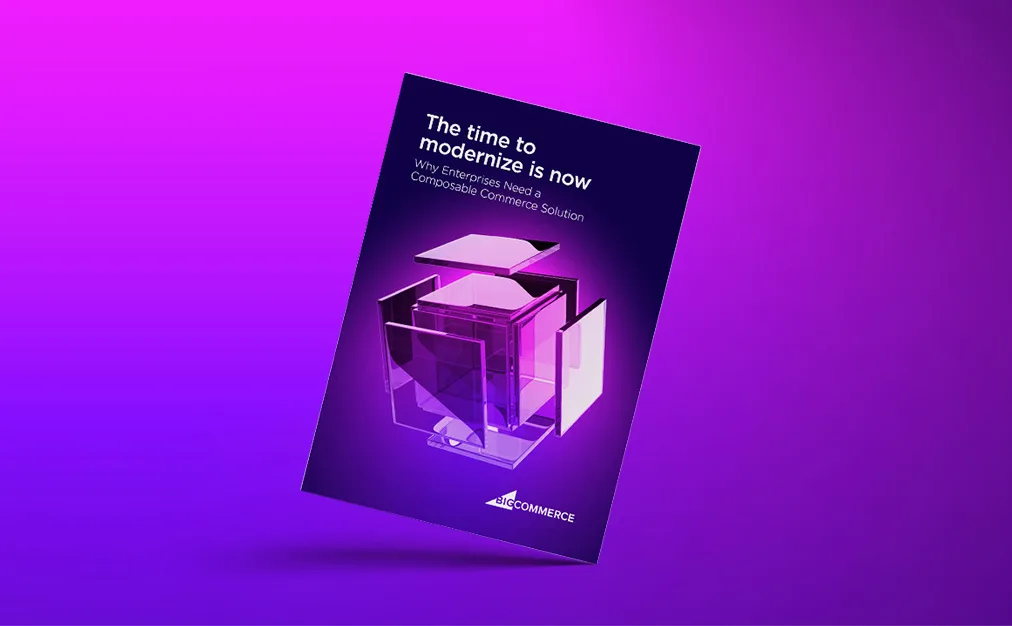
Why Enterprises Need Composable Commerce
Discover why now is the time for enterprises to invest in a future-fit composable commerce solution that enables digital innovation.

Approaching Composable Commerce From Every Angle on Deity’s Podcast


Approaching Composable Commerce From Every Angle on Deity’s Podcast
Get The Print Version
Tired of scrolling? Download a PDF version for easier offline reading and sharing with coworkers.
A link to download the PDF will arrive in your inbox shortly.
Ecommerce can be a bit like cooking. You gather the best ingredients, make sure your tools and working area set you up for success, then you get down to cooking.
Composable commerce is an approach to ecommerce that’s just like that. Bring together everything you need for your business’ specific needs to deliver the best shopping experience for your customers.
BigCommerce Senior VP of Product Marketing, Meghan Stabler, joined Deity Co-founder and CMO, Jamie Maria Schouren, to talk about everything composable on Deity’s podcast: The Commerce Composers.
In their conversation, they touched on open commerce, MACH and the value of partnerships, among other relevant topics.
Composing the World With Meghan Stabler
Jamie Maria Schouren: Something we’re going to talk about today is not just composable commerce. I like to call it the composable approach. It’s something you choose. It’s something that we as partners or merchants choose to do instead of… It’s not a gimmick. It’s not a feature. It’s really an approach. And that approach for the merchant obviously is on the tech side. Like, “Hey, I can combine different tech together.”
But more important on our side as tech partners is how can I prepare my tech and my story around that so it can be used in a partnership way. I remember BigCommerce saying, “Ok, we are open Saas.” I’m like, “What? Open Saas? That’s like a contradiction.” Where did that term come from? How would you describe it?
Meghan Stabler: “It’s kind of an oxymoron, right? Because SaaS is meant to be closed, right? The example I’ll use is like Gmail, right? It’s not like you as the end consumer can do a lot with Gmail. Yeah, you can configure some things and change your settings and your colors from white or white background to dark background and add an email signature, but it’s closed, right? And that is what SaaS has traditionally been — is a closed platform. Salesforce would be an example of that. Microsoft would be an example of that, right? Apple is a good example of that.
“When you look, then, at the alternative, it’s open source… I’m British by birth, I live in the [United] States in Austin, Texas, so it’s like the Wild West sometimes. And you think of open source as that. You’ve got open source code that anybody can go code to. Hopefully, figures crossed, there’s a standard in there. And it also puts you at risk because you’re going to have to maintain it, you’re going to have to worry about the upgrades. You’re going to have to worry when a new part of the open source comes out. Is it going to fit with my organization? Am I going to have to make changes to it? So there has to be a balance, right?
“And this was what we defined many years ago. Can we take this closed SaaS platform and begin to open it up? So when we think about, and again we’ll probably talk about MACH and the MACH Alliance and the MACH initiative. Very similar to that. Can we make it modular? Can we open it up through APIs? It’s in the cloud, right? And that H on MACH is obviously headless, right? So we obviously are headless, as well.
“But let’s look at a modular approach to SaaS. The vast majority of what a merchant needs or really what the developer would need or an agency partner would need is opened up. So whether it’s from checkout to promotions.
“You name it, it’s opened up in the platform. So you can create amazing experiences — unique experiences — for the shopper.”
This interview excerpt has been edited for length and clarity.

Pablo Gallaga is a Senior Manager of Content Marketing at BigCommerce where he focuses on thought leadership content. His years of experience in tech, from startups to enterprise, inform his ecommerce insights.


